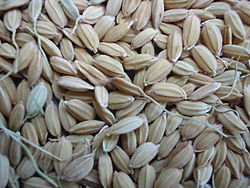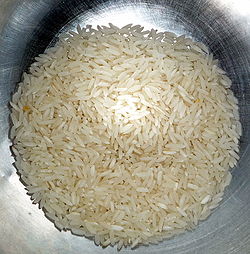Note: This is a project under development. The articles on this wiki are just being initiated and broadly incomplete. You can Help creating new pages.
Oryza sativa - Dhanya
Oryza sativa rice is an erect, usually annual grass though there are also perennial forms. It varies considerably in height and habit according to variety with cultivars ranging from 30 - 180cm tall. Rice has been cultivated in India and China for at least 4,000 years.
Contents
[hide]- 1 Uses
- 2 Parts Used
- 3 Chemical Composition
- 4 Common names
- 5 Properties
- 6 Habit
- 7 Identification
- 8 List of Ayurvedic medicine in which the herb is used
- 9 Where to get the saplings
- 10 Mode of Propagation
- 11 How to plant/cultivate
- 12 Commonly seen growing in areas
- 13 Photo Gallery
- 14 References
- 15 External Links
Uses
Stomach disorders, Lecorrhea, Cough, Cough, Acidity, Wounds[1]
Parts Used
Chemical Composition
Common names
| Language | Common name |
|---|---|
| Kannada | Akki, Bhattha, Nellu |
| Hindi | Chaval, Dhan |
| Malayalam | Ari, Navaranellu, Nellu |
| Tamil | Arisi, Nellu |
| Telugu | Biyyam, Vudlu |
| Marathi | NA |
| Gujarathi | NA |
| Punjabi | NA |
| Kashmiri | NA |
| Sanskrit | Dhanya, Khanjarita, Sastika, Vilavasin |
| English | Rice |
. [3]
Properties
Reference: Dravya - Substance, Rasa - Taste, Guna - Qualities, Veerya - Potency, Vipaka - Post-digesion effect, Karma - Pharmacological activity, Prabhava - Therepeutics.
Dravya
Rasa
Madhura (Sweet), Kashaya (Astringent)
Guna
Laghu (Light), Snighdha (Slimy)
Veerya
Sheeta (cold)
Vipaka
Madhura (Sweet)
Karma
Pitta
Prabhava
Habit
Identification
Leaf
| Kind | Shape | Feature |
|---|---|---|
| Simple | Alternate | Culms 50-120 cm high, erect, rooting at the lower nodes; nodes glabrous. |
Flower
| Type | Size | Color and composition | Stamen | More information |
|---|---|---|---|---|
| Bisexual | Panicle | Pale yellow | 10 | 10-25 cm long, lax. Spikelets 7-10 mm long, oblong, awned or not. Glumes reduced. First lemma 7-10 mm long, oblong-lanceolate, empty. |
Fruit
| Type | Size | Mass | Appearance | Seeds | More information |
|---|---|---|---|---|---|
| Grain | Oblong, tightly enclosed by the lemma and palea | {{{6}}} |
Other features
List of Ayurvedic medicine in which the herb is used
Where to get the saplings
Mode of Propagation
How to plant/cultivate
Season to grow
Soil type
Propagation
Commonly seen growing in areas
Tropical area, Sub tropical area
Photo Gallery
References
- Jump up ↑ Uses
- Jump up ↑ ”Karnataka Medicinal Plants Volume-3” by Dr.M. R. Gurudeva, Page No.950, Published by Divyachandra Prakashana, #6/7, Kaalika Soudha, Balepete cross, Bengaluru
- Jump up ↑ Vernacular names
- Jump up ↑ PLANTS OF KERALA VER.2, N. Sasidharan BOTANIC DESCRIPTION
External Links
- Ayurvedic Herbs known to be helpful to treat Stomach disorders
- Ayurvedic Herbs known to be helpful to treat Lecorrhea
- Ayurvedic Herbs known to be helpful to treat Cough
- Ayurvedic Herbs known to be helpful to treat Acidity
- Ayurvedic Herbs known to be helpful to treat Wounds
- Herbs with Root used in medicine
- Herbs with Seed used in medicine
- Herbs with common name in Kannada
- Herbs with common name in Hindi
- Herbs with common name in Malayalam
- Herbs with common name in Tamil
- Herbs with common name in Telugu
- Herbs with common name in Sanskrit
- Herbs with common name in English
- Habit - Herb
- Index of Plants which can be propagated by Seeds
- Herbs that are commonly seen in the region of Tropical area
- Herbs that are commonly seen in the region of Sub tropical area
- Herbs
- Poaceae





